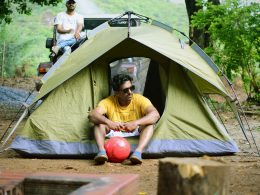Many of us have felt that yearning at one point or another — a desire to drop everything and hit the road, leading a life of adventure exploring the country. But for many, it seems like a distant fantasy, an impossible pipe dream they could never achieve.
They couldn’t be more wrong. These days, it’s easier than ever to live a life on the road as an RV nomad. So what exactly do you need to do before you can pack your bags? Let’s look at it step-by-step.

What Is an RV Nomad?
An RV nomad is a full-time traveler who uses a motorhome, trailer, or other types of RVs as their home. They have a desire to travel, explore, and experience new things.
Typically, they’re young and either single or couples. This means they’re still in their prime working years and often need to work while traveling to support themselves. However, older nomads or those with families become RV nomads too.
How Do RV Nomads Make Money?
RV nomads make money in as many ways as traditional workers who stick to one place. The vast majority work remotely, using a mobile internet connection and cell phone to accomplish most of the same things as they would in an office.
Many find employment in tech, customer service, finance or accounting, and the creative professions. But you can adapt many other office jobs to life on the road. You may even find entrepreneurs like real estate investors, e-commerce store operators, or social media influencers.
Others work in careers that allow them to apply their trade while traveling. These can include tradespeople, craft makers, RV mechanics, outdoor guides, or campground workers.

Some travel to specific regions for seasonal employment in agriculture or other industries. Even medical professionals can find positions as traveling doctors or nurses that allow them to live a semi-nomadic lifestyle.
Of course, some RVers simply don’t make money. Many are retired and earn a pension, social security payments, or income from their retirement investments. Still, others may need a mid-career break and live on their savings.
In short, RV nomads finance their lifestyle in numerous ways, allowing would-be RVers to find the one that works best for them.
How Much Money Do You Need to Be an RV Nomad?
This answer will depend on your lifestyle, current savings, and financial goals. For some, being an RV nomad is about simple living.
They feel content in a van or small trailer, don’t travel long distances, stay at modestly priced parks or boondock, and don’t eat out or shop much. In this case, it may surprise you how little you’ll need to get by, perhaps only $750-$1,500 per person a month.
For others, RV nomad life isn’t complete without comforts and a few luxuries here and there. They’ll stay at the most deluxe RV resorts, sample all the best local restaurants, and travel far and wide, all in a relatively roomy Class A or fifth wheel.
For these folks, the sky is the limit. They can quickly find themselves spending $2,000 to $3,000 or more per month per person, easily eclipsing the spending of most non-nomads.
How to Easily Become an RV Nomad
If you’ve decided the nomad life is for you, you may wonder how to get there from your current lifestyle. Here are some of the most important steps to tackle before hitting the road.
Find Remote Work
Unless you’re retired or plan on living on your savings, this is perhaps the most significant hurdle to clear for many looking to become an RV nomad. The good news is that post-pandemic, more jobs have gone fully remote. For others, you may get to negotiate in the right situation.
Most job-search websites have clear categories for remote work, while some specialize in remote jobs. RV groups or forums can also point you in the right direction in many cases.
Be clear about how you’ll work. You don’t want to lose your main source of income once you hit the road just because your boss finds out you’re RVing.
In most cases, you’ll also need to take steps to stay connected while on the road, whether through hotspots, coworking spaces, or other methods. You can’t always rely on campground Wi-Fi, so it’s crucial to have backups available.
HOT TIP
Here are 7 jobs you can do as a nomad in the US.
Determine Your Budget
You should have a general idea of the kind of lifestyle you hope to lead as an RV nomad and the income you can expect each week or month. From here, you can put together a rough budget.
Try to include everything you’ll spend money on, from campground fees and gas to cell phone plans and storage units, if necessary. As with any budget, pad it a bit for emergencies. This should give you a rough idea of how much money you’ll need each month, which you can tweak as necessary.

Buy an RV
It’s the moment of truth — time to find your new home on the road. There are a few things to keep in mind when RV shopping. First, your budget may dictate what kind of rig you’ll use — new, high-end Class As can sell for more than $1 million.
However, you can also find smaller or older used motorhomes or trailers for just a few thousand. Your budget will help inform what you can pay monthly unless you plan to buy your rig outright.
Consider your needs and wants as well. A single person may live happily in a small, studio-style trailer, while a family of four will need more space, like a Class A or Super C. Think about your other needs too.
Will you need a dedicated workspace? How’s the storage? What about luxuries like an outdoor kitchen, washer and dryer, or second bathroom? Your choice of RV can make the difference between the nomad lifestyle of your dreams or a road trip nightmare.
HOT TIP
Find out which is better: a DIY van build or buying a Class B camper van?
Figure Out Logistics
You’ve figured out two significant things: your finances and your home. Now, tackle the many other smaller logistical issues of a mobile lifestyle.
First, there’s your mail. You may wish to forward your mail to a relative, if possible, who can then send you any important letters or packages.
Others may want to sign up for various mailbox services, including ones geared to RVers. These services will provide an address, forwarding services, and often other features like scanning or check cashing.
In some cases, you can also use them to establish a domicile in a state. Naturally, these will cost extra but may be worth it for some.
You’ll also need to figure out your health insurance. If you’re lucky enough to have coverage through your job, make sure you’ll get coverage in other regions of the country.

Meantime, others may need to secure their own insurance through private companies or the Affordable Care Act exchanges. There are also non-insurance “health sharing” plans designed to pay the medical costs of participants, but read the fine print and understand what’s covered.
Next, in almost all cases, you’ll need to downsize as you move into your RV. So you’ll need to deal with your stuff as well. Some future RVers sell, donate, or throw out most of their possessions, while others rent a storage unit to hold onto important items until they return to a more typical home.
Speaking of your home, you may also need to sell, rent, or sublet your house or apartment. All of this can take quite a bit of time, so start well before your planned departure date.
Plan Your Travels
Now comes the fun part. Figure out where you want to go. Some RV nomads hit the road with a definite plan or route, like driving across the country or visiting every national park.
Others are more flexible, figuring out their home a few days or weeks at a time, heading wherever seems interesting. In this case, set out a few broad goals or attractions to see to help structure your travel a bit.
No matter your style, it’s helpful to understand your resources. Use one of the many RV-related apps or a physical RV atlas to keep a directory of RV parks and campgrounds for easy reference. Meantime, Google Maps can be your best friend in tracking down free overnight camping spots like Walmarts, Cracker Barrels, or other similar locations.

Popular RV parks in desirable regions can fill up quickly in the high season, so make your plans early. For example, get reservations if you’ll visit Florida in the winter or Yellowstone during the summer.
The last step in planning your travels is to consider your exit plan unless you expect to be an RV nomad for the rest of your life. Consider what events or circumstances would mean it’s time to wrap up life on the road and settle down.
These could include a job loss, health situation, or simply deciding it isn’t right. Knowing this in advance can save a lot of stress and anxiety in the future.
Is It Easy to Become an RV Nomad?
Becoming an RV nomad is pretty simple, but it isn’t always easy for many people. Changes in the prevalence and acceptability of remote work have revolutionized RV life, making the path toward a nomadic life easier than ever.
Nevertheless, it can still be a struggle to get there. You’ll come across unexpected hurdles and expenses as you begin to adapt your life. However, some consider it one of the most rewarding experiences of a lifetime, making all the work worthwhile.
Is becoming an RV nomad in your future?
If You Want the Latest Travel News, Join Our Mailing List
Don’t rely on biased RV industry news sources to keep you informed. Stick with Nomadic News. We publish articles and breaking stories that matter to you every weekday.










